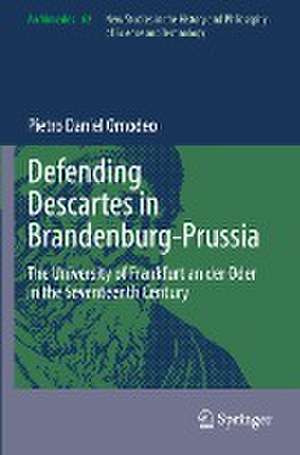Defending Descartes in Brandenburg-Prussia: The University of Frankfurt an der Oder in the Seventeenth Century: Archimedes, cartea 62
Autor Pietro Daniel Omodeoen Limba Engleză Paperback – 29 aug 2023
| Toate formatele și edițiile | Preț | Express |
|---|---|---|
| Paperback (1) | 778.76 lei 43-57 zile | |
| Springer International Publishing – 29 aug 2023 | 778.76 lei 43-57 zile | |
| Hardback (1) | 785.55 lei 22-36 zile | |
| Springer International Publishing – 28 aug 2022 | 785.55 lei 22-36 zile |
Din seria Archimedes
- 5%
 Preț: 909.01 lei
Preț: 909.01 lei - 18%
 Preț: 899.21 lei
Preț: 899.21 lei - 18%
 Preț: 785.55 lei
Preț: 785.55 lei -
 Preț: 382.36 lei
Preț: 382.36 lei - 18%
 Preț: 1833.33 lei
Preț: 1833.33 lei - 15%
 Preț: 643.84 lei
Preț: 643.84 lei - 18%
 Preț: 951.77 lei
Preț: 951.77 lei - 15%
 Preț: 645.79 lei
Preț: 645.79 lei - 15%
 Preț: 644.30 lei
Preț: 644.30 lei - 20%
 Preț: 577.17 lei
Preț: 577.17 lei - 18%
 Preț: 1108.04 lei
Preț: 1108.04 lei - 15%
 Preț: 646.62 lei
Preț: 646.62 lei - 18%
 Preț: 1110.09 lei
Preț: 1110.09 lei - 18%
 Preț: 1216.65 lei
Preț: 1216.65 lei - 18%
 Preț: 730.02 lei
Preț: 730.02 lei - 18%
 Preț: 1552.22 lei
Preț: 1552.22 lei - 18%
 Preț: 891.48 lei
Preț: 891.48 lei - 18%
 Preț: 776.88 lei
Preț: 776.88 lei - 18%
 Preț: 1214.60 lei
Preț: 1214.60 lei - 18%
 Preț: 1113.26 lei
Preț: 1113.26 lei - 18%
 Preț: 777.69 lei
Preț: 777.69 lei - 18%
 Preț: 995.83 lei
Preț: 995.83 lei - 15%
 Preț: 635.47 lei
Preț: 635.47 lei - 24%
 Preț: 1459.25 lei
Preț: 1459.25 lei - 18%
 Preț: 948.47 lei
Preț: 948.47 lei - 18%
 Preț: 1666.97 lei
Preț: 1666.97 lei - 18%
 Preț: 1114.83 lei
Preț: 1114.83 lei - 15%
 Preț: 645.60 lei
Preț: 645.60 lei
Preț: 778.76 lei
Preț vechi: 949.71 lei
-18% Nou
Puncte Express: 1168
Preț estimativ în valută:
149.02€ • 155.98$ • 124.03£
149.02€ • 155.98$ • 124.03£
Carte tipărită la comandă
Livrare economică 31 martie-14 aprilie
Preluare comenzi: 021 569.72.76
Specificații
ISBN-13: 9783031019661
ISBN-10: 3031019660
Pagini: 214
Ilustrații: XXX, 214 p. 19 illus. in color.
Dimensiuni: 155 x 235 mm
Greutate: 0.35 kg
Ediția:1st ed. 2022
Editura: Springer International Publishing
Colecția Springer
Seria Archimedes
Locul publicării:Cham, Switzerland
ISBN-10: 3031019660
Pagini: 214
Ilustrații: XXX, 214 p. 19 illus. in color.
Dimensiuni: 155 x 235 mm
Greutate: 0.35 kg
Ediția:1st ed. 2022
Editura: Springer International Publishing
Colecția Springer
Seria Archimedes
Locul publicării:Cham, Switzerland
Cuprins
Chapter 1. Cartesianismus-Streit at Frankfurt an der Oder: Johannes Placentinus and His Opponents, 1653-1656.- Chapter 2. Nature and Scripture: Confessional Networks and Cross-Confessional Exegetic Problems.- Chapter 3. A Cartesian-Scholastic Controversy over the Origin of Life Opposing Frankfurt and Wittenberg, 1659-1660.- Chapter 4. The Mechanization of Astrology, 1661-1665.- Chapter 5. Placentinus’s Cometary Correspondence with Hevelius and Lubieniecki.- Chapter 6. Medical and Demonological Approaches to Descartes’s Psychophysical Dualism: Andreae and Brecht.- Chapter 7. Cartesian Bodies: Experiments on Embalmment.- Chapter 8. The Cultural Politics of Cartesianism.
Notă biografică
Pietro Daniel Omodeo is a cultural historian of science and a professor of historical epistemology at the Department of Philosophy and Cultural Heritage, Ca’ Foscari University of Venice (Italy). He is the principal investigator of the ERC Consolidator research endeavor “Institutions and Metaphysics of Cosmology in the Epistemic Networks of Seventeenth-Century Europe” (Horizon 2020, GA 725883). Among others, he is the author of Political Epistemology: The Problem of Ideology in Science Studies (2019) and Science in Court Society: Giovanni Battista Benedetti’s Diversarum speculationum mathematicarum et physicarum liber (Turin, 1585) (with Jürgen Renn) (2019). His books also include the edited volumes Cultural Hegemony in a Scientific World: Gramscian Concepts for the History of Science (with Massimiliano Badino) (2020); Bernardino Telesio and the Natural Sciences in the Renaissance (2019); and Contingency and Natural Order in Early Modern Science (with Rodolfo Garau) (2019).
Textul de pe ultima copertă
This volume is a study of the many dimensions of the early reception of Cartesianism in German-speaking Europe during the seventeenth century based on the case of the University of Frankfurt an der Oder. It investigates the broad context of that discussion, which was at once scientific, cultural, political and socio-institutional. Chapter by chapter, the book sheds light on the most relevant aspects of the environment of the time. It is aimed at historians of science and philosophy, as well as scholars investigating German-speaking Europe of the 17th century.
Caracteristici
New perspectives on the history of Cartesian philosophy A socially embedded history of science and philosophy A novel insight in the cultural politics of early modern thought in Prussia
